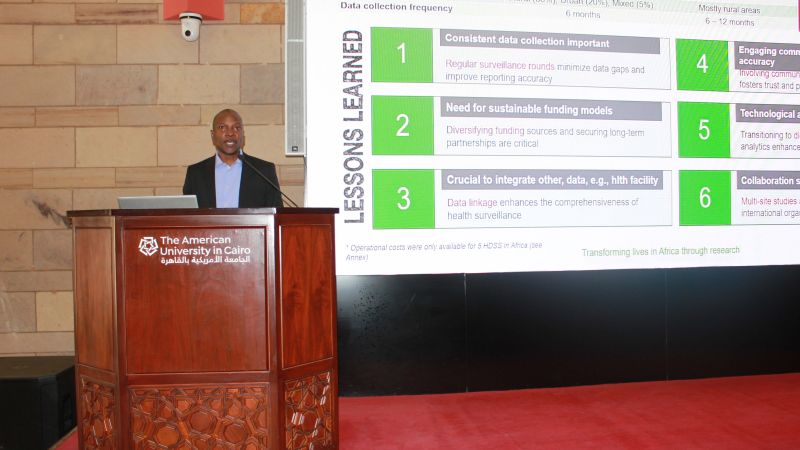The American University in Cairo (AUC) is hosting the first steering committee meeting of the African Population Cohorts Consortium (APCC), a major initiative in public health research. The gathering is taking place at AUC’s New Cairo campus from September 1 to 4 under the theme “Data Exchange and Harmonization Across Africa.”
Launched in May 2024 in Cape Town, APCC brings together more than 40 African research groups from 16 countries, united around a shared research vision. The consortium is designed to strengthen Africa’s capacity in population health studies through long-term, large-scale research. It has received significant backing from the Wellcome Trust Foundation, which has pledged £4 million to establish a permanent secretariat, to be hosted by the Science for Africa Foundation.
“Organizing this meeting as the first for the Steering Committee, following the important news of new funding and the start of the implementation steps of APCC, highlights AUC’s impactful contribution and its commitment to supporting public health research in Africa,” said Mohamed Salama, professor of global health and human ecology at AUC and a steering committee member.
The consortium’s work is centred on three core areas: examining health across life stages and generations, assessing the health impacts of climate change on vulnerable communities, and promoting universal health coverage. These goals align with the Health Research and Innovation Strategy for Africa (2018–2030), positioning the continent to set ethical standards and take ownership of its health data.
On the sidelines of the meeting, AUC announced the launch of the African Brain Health Institute (ABHI) Fellowship Program. Developed in collaboration with the Global Brain Health Institute (GBHI), the fellowship will be jointly hosted by AUC in Egypt and the Aga Khan University (AKU) in Kenya. The one-year program will train African researchers in protecting aging populations from threats to brain health, with a curriculum tailored to the continent’s cultural and social context.
Iracema Leroi, director of GBHI, described the fellowship as a landmark step: “The African Brain Health Institute will empower a new generation of African leaders to shape solutions for brain health that honor culture, context, and community. Together with GBHI, this fellowship is a bold step toward a healthier future for Africa and the world.”
APCC chair Kobus Herbst emphasized the importance of collaboration: “This consortium represents a long-awaited convergence of Africa’s population research leaders. Our collective effort will generate the evidence base needed to achieve universal health coverage, address context-specific health challenges, and inform national and regional policy from an African perspective.”
The meeting has drawn international experts and partner organizations from the United States, Europe, Latin America, and Africa. Among the participants are the Health and Retirement Study (HRS) in the US, the Survey of Health and Retirement in Europe (SHARE), RED-Lat (a Latin American dementia consortium), INSPIRE 2.0, the Implementation Network for Sharing Population Information from Research, and the International Parkinson’s Disease Genome Consortium (IPDGC)-Africa.
By fostering collaboration across continents, the APCC seeks not only to build Africa’s research capacity but also to contribute to global solutions for health challenges linked to climate change, ageing populations, and health systems.

